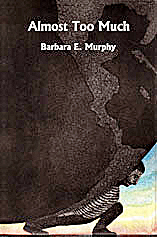Murphy’s book explores honest aspects of humanity

Cover art by Ken Leslie
Barbara Murphy’s poetry collection, “Almost Too Much,” opens the door for discussion on the thoughts and observations of the mid-life, and the fears that one might gain through aging.
Murphy explores themes such as second-marriages, loss, parenting and childhood reflections, and life experiences that border “almost too much” for a person to undergo.
This is introduced right from the beginning, with the cover art showing the earth on the back of a person who is just barely able to support the weight.
Murphy divides her collection into three parts, each exploring a wide variety of symptoms of the human condition.
“Thaw” begins the book by leaving the reader with a feeling of sympathy and connection toward the narrator. “You do not know/ how to respond,” Murphy writes, “certain this year/ that everything out of order/ blames you.” She leaves the poem off on a point of delicacy, first noting two small birds eating copious amounts of seed and how the lightness of their interactions prevent them from being labelled gluttonous. “You make a sound/ more breath than words./” she closes the very first piece in the collection with the same delicate language, “Just when you thought all you knew/ were prayers of petition.”
Murphy frequently considers the weight of difficult circumstances while depicting a realistic narrative in each of her poems. She sometimes invokes metaphorical images, especially those involving nature and creatures, to strengthen the reader’s connection with her physical and emotional feelings.
In “After the Lake House” she writes, “A year later/ from the raggedy edge of now/ I ask, “Do you miss it?”/ “I don’t look back is her reply.”/ As if back is an underworld,/ a swamp of old life,/ already half-lost to decay.”
Issues surrounding time and the speed at which we move through life are also subject to scrutiny through Murphy’s observation of space and relationships within her narratives. “One child six zones to the East,/ the others three hours West.” From “Calculating the Time Difference,” “I am left/ not so much in the middle as part of another world always/ behind or ahead or reaching/ for the wrong words.”
She often mentions this type of concern for life moving too fast in a bold and embracing manner. In “Fears at Mid-Life: Conversation with My New Husband,” she writes about the narrator’s physical fears and her husband’s abstract ones, but joins the two together by writing, “Speed is out mutual terror—/ running out of everything too soon.”
Aging is also directly addressed in a somewhat quietly humorous manner, with a group of women getting together to take a photograph, and having the women become surprised to find that they are no longer young. This type of realization is the direct confrontation that makes Murphy’s poetry seem true to the heart.
Murphy’s poetry is highly readable and provides a trip into the life of what seems to be one woman and her appreciative, truthfully-human way of being. She describes situations that are relatable in the eyes of both parent and child, and honest concerns that will resonate with all.
Marilyn joined the Basement Medicine staff in Spring 2015 as a staff writer and managing editor.





